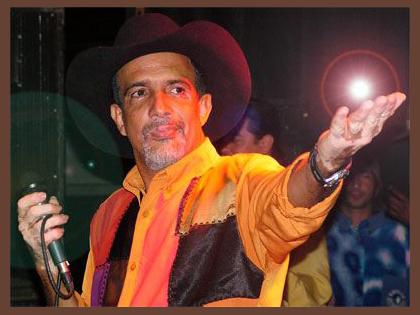 Edigar Mão Branca
Edigar Mão Branca
Édgar Mão Branca: A Saga of Music, Controversy, and Enduring Legacy
Amidst the vibrant cultural tapestry of Brazil, Édgar Mão Branca emerged as a musical force that transcended genres and left an indelible mark on the nation's soundscape. His iconic song "Cavalgada" became an anthem that resonated deeply with countless Brazilians, propelling him to stardom.
Early Life and Musical Beginnings
Born in the northeastern state of Bahia, Édgar had an innate talent for music and guitar playing. As a young man, he immersed himself in the rhythms and melodies of traditional Brazilian genres, such as forró and baião. In 1966, he formed his first band, "Édgar e a Bateria," with his brothers.
Rise to Prominence with "Cavalgada"
In 1971, Édgar released his debut album, "Cavalgada," which featured the title track that would become his signature song. "Cavalgada" was an infectious blend of forró, rock, and soul, boasting energetic rhythms, evocative lyrics, and Édgar's distinctive vocals. The song became an instant hit, propelling the album to over one million sales and establishing Édgar as a rising star.
Musical Journey and Challenges
Édgar's music continued to evolve throughout his career. He experimented with various styles, incorporating elements of funk, blues, and samba into his compositions. His albums, such as "Vai Que Vai" (1973) and "Bahia de Todos os Ritmos" (1977), showcased his eclecticism and musical virtuosity.
However, Édgar's path was not without its challenges. He faced censorship during the repressive military regime in Brazil, with some of his songs being banned from radio play. He also encountered legal disputes and financial difficulties at times.
Controversies and Legacy
Édgar's outspoken nature and willingness to tackle social and political issues in his music often landed him in the spotlight for the wrong reasons. He was accused of plagiarism, which he vehemently denied, and his personal life occasionally made headlines.
Despite these controversies, Édgar's talent and enduring influence cannot be denied. His music remains a beloved soundtrack to the lives of many Brazilians, and "Cavalgada" continues to be a timeless classic.
Members and Discography
Throughout his career, Édgar Mão Branca played alongside various musicians, including his brothers, Luiz and Gilmar, as well as renowned artists such as Gilberto Gil and Caetano Veloso.
His discography includes over 30 studio albums, several live albums, and numerous compilations. Some of his most notable works include:
* Cavalgada (1971)
* Vai Que Vai (1973)
* Bahia de Todos os Ritmos (1977)
* Tropicana (1983)
* O Canto da Sereia (1995)
Édgar Mão Branca's legacy is one of a musical pioneer who broke down barriers and left an unforgettable mark on Brazilian music. His songs, imbued with passion, authenticity, and enduring appeal, continue to inspire and captivate generations of listeners.
Amidst the vibrant cultural tapestry of Brazil, Édgar Mão Branca emerged as a musical force that transcended genres and left an indelible mark on the nation's soundscape. His iconic song "Cavalgada" became an anthem that resonated deeply with countless Brazilians, propelling him to stardom.
Early Life and Musical Beginnings
Born in the northeastern state of Bahia, Édgar had an innate talent for music and guitar playing. As a young man, he immersed himself in the rhythms and melodies of traditional Brazilian genres, such as forró and baião. In 1966, he formed his first band, "Édgar e a Bateria," with his brothers.
Rise to Prominence with "Cavalgada"
In 1971, Édgar released his debut album, "Cavalgada," which featured the title track that would become his signature song. "Cavalgada" was an infectious blend of forró, rock, and soul, boasting energetic rhythms, evocative lyrics, and Édgar's distinctive vocals. The song became an instant hit, propelling the album to over one million sales and establishing Édgar as a rising star.
Musical Journey and Challenges
Édgar's music continued to evolve throughout his career. He experimented with various styles, incorporating elements of funk, blues, and samba into his compositions. His albums, such as "Vai Que Vai" (1973) and "Bahia de Todos os Ritmos" (1977), showcased his eclecticism and musical virtuosity.
However, Édgar's path was not without its challenges. He faced censorship during the repressive military regime in Brazil, with some of his songs being banned from radio play. He also encountered legal disputes and financial difficulties at times.
Controversies and Legacy
Édgar's outspoken nature and willingness to tackle social and political issues in his music often landed him in the spotlight for the wrong reasons. He was accused of plagiarism, which he vehemently denied, and his personal life occasionally made headlines.
Despite these controversies, Édgar's talent and enduring influence cannot be denied. His music remains a beloved soundtrack to the lives of many Brazilians, and "Cavalgada" continues to be a timeless classic.
Members and Discography
Throughout his career, Édgar Mão Branca played alongside various musicians, including his brothers, Luiz and Gilmar, as well as renowned artists such as Gilberto Gil and Caetano Veloso.
His discography includes over 30 studio albums, several live albums, and numerous compilations. Some of his most notable works include:
* Cavalgada (1971)
* Vai Que Vai (1973)
* Bahia de Todos os Ritmos (1977)
* Tropicana (1983)
* O Canto da Sereia (1995)
Édgar Mão Branca's legacy is one of a musical pioneer who broke down barriers and left an unforgettable mark on Brazilian music. His songs, imbued with passion, authenticity, and enduring appeal, continue to inspire and captivate generations of listeners.